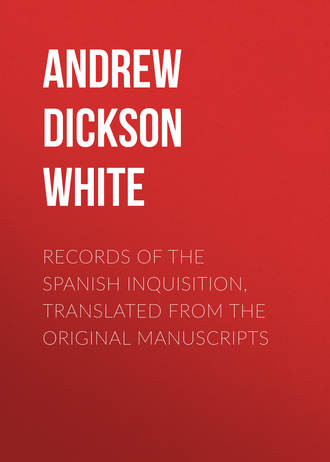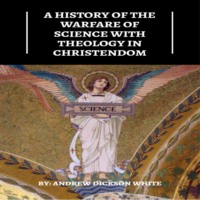 полная версия
полная версияRecords of the Spanish Inquisition, Translated from the Original Manuscripts
The above is the truth according to the oath of the deponent, who has not uttered it out of malice or ill will, but solely to discharge her conscience; and having been read, she declared that it was correctly recorded.
Done at Gerona on the fourth day of July, one thousand seven hundred and ninetytwo.
The said Narcisa Catala Fabre y Pinsach not being able to write, I sign the above.
Juan Salgueda, Presbyter, &c.Before me—
Dr Marcial Llistorella, Presbyter,Notary in this Investigation.* * * *MOST ILLUSTRIOUS SIR,
Being in company with Juan Bautista Viada, mason, on the twelfth day of the present month, and discoursing of sermons upon the state of the soul, I am very confident that he made this remark; that he had heard sundry persons declare they believed nothing about hell or purgatory, but as for himself, he believed. Which information I give your Excellency in obedience to the dictates of my conscience.
Mataro, November 17th, 1819.
Your most humble servant,Franch. Plana, Carpenter.On the road beyond the gate of Batlleix.21
Let a commission be expedited for the examination of the above letter.
To the Reverend Father Pedro Martir de S. Vicente, Capuchin and Ex Lecturer of his order.
We hereby grant you a commission to summon before you, and another ecclesiastic to act as Notary, first swearing secrecy, Francisco de Asis Plana, carpenter, residing opposite the gate of Batlleix of this city. You will subject him to a regular examination respecting a letter of his which is herewith enclosed, and exact an oath from him that the letter is his, written by himself and its contents true. You will ascertain whether he has anything to add or alter respecting it, and after four days you will ratify the same ad perpetuam, in the presence of two other ecclesiastics sworn to secrecy. In the same manner you will proceed to take separately the depositions of Juan Bautista Viada, mason, and of the other persons whom he states were present when the speeches in question were uttered; these depositions to be also ratified. You will not omit to question him who these persons were, according to the regular form. You will note in the margin of the paper which shall contain the depositions, the degree of credit which they deserve; and you will also transmit, separately, an account of the lives, character, and behaviour of the persons denounced. With these you will return this commission and the other papers. God preserve you many years.
Royal Palace of the Inquisition of Barcelona, December 18th, 1819.
Dr Don Jose Llozer.The Licentiate,
Don Santo de Basarrate.D. D. Juan de Calva y Marti, Sec’y.In the city of Mataro, bishopric of Barcelona, on the twentyeighth day of December, one thousand eight hundred and nineteen, before Father Pedro Martir de San Vicente, Presbyter and Commissary, specially appointed in virtue of a commission to this effect, and before me, P. Bernardino de Barcelona, Presbyter Notary, having sworn to preserve secrecy and perform faithfully our duties, appeared voluntarily and made oath in the name of God our Lord, with the sign of the cross, to declare the truth and preserve secrecy, with respect to everything demanded of him which he knew, a person calling himself Francisco de Asis Plana, carpenter, aged fiftyseven years.
Questioned, if he knew or conjectured the cause of his being summoned to appear by the Holy Office.
Answered, Yes.
Questioned, if he had written, or caused to be written at any time, a letter to the Tribunal of the Inquisition, giving an account of some crime within his knowledge, and who was the person to whom he referred.
Answered, that he had written a letter against Juan Bautista Viada, mason. The letter was then exhibited and the first clause of it read, when the deponent declared it to be his, and that its contents were true.
Questioned, if he had anything to add or alter in the said letter.
Answered, that if it were not for the apprehension of falling into an error, he should alter, ‘I am confident,’ to ‘I am certain.’
Questioned, if there were other persons present when Juan Bautista Viada made the assertions in question.
Answered, No.
Questioned, if he knew that any other person had said or done anything which came under the cognizance of the Holy Office.
Answered, No.
Questioned, what was the age, appearance, and habitation of the person denounced.
Answered, that he was about fiftysix years old, and lived in the Calle de Argentona, in Mataro.
The above having been read to the deponent was declared by him to be correctly recorded. He stated further that he had nothing to add or alter respecting it; and that he did not make the declarations therein contained, out of malice, but solely from conscientious motives. Secrecy was enjoined upon him, which he promised, and added his signature.
Francisco de Asis Plana.Fr. Pedro Martir de San Vicente,Presbyter Capuchin.Before me—
P. Bernardino de Barcelona, Presbyter,Notary, and Commissary, appointed forthis Purpose.In the city of Mataro, bishopric of Barcelona, on the sixteenth day of January, one thousand eight hundred and twenty, before Father Pedro Martir de San Vicente, Presbyter Capuchin, and Commissary, by a special commission for this purpose, and me, Father Bernardino de Barcelona, Notary, having sworn to preserve secrecy, and perform faithfully our offices, appeared and made oath in the name of God our Lord, with the sign of the cross, to declare the truth, and observe secrecy, a person calling himself Juan Bautista Viada, a native of Mataro, in the bishopric of Barcelona, by occupation a mason, aged fiftyfour years.
Questioned, if he knew or conjectured the cause of his being summoned to appear.
Answered, No.
Questioned, if he knew that any person or persons had said there was no Hell nor Purgatory, or made any other assertion which came under the cognisance of the Holy Office.
Answered, that he had heard the above assertion uttered by Magin Casanovas, or Barcelo, a person who died two years since.
Questioned, what persons were present when these words were spoken; and if the said Magin Casanovas was in his right mind; also, whether the assertion was made in a positive manner, or by referring to some other person, and whether it was made in jest, or dispute, or passion.
Answered, that he did not recollect whether it was said in the presence of others or not, but that it appeared to be said in a positive manner, and not in the heat of passion; that the abovementioned Magin Casanovas was a Marine Alguacil of this city, of which he was also a native, and that his age was about seventy years.
Questioned, if he remembered how many times the assertion had been made, and if he received any rebuke for it.
Answered, that he did not remember.
Questioned, why he had not denounced the speaker to the Holy Tribunal.
Answered, that the thought of this never occurred to him.
Questioned, if he knew that any other person had said or done anything which belonged to the cognizance of the Holy Tribunal.
Answered, No.
The above having been read to the deponent, was declared by him to be correctly recorded; and he further stated that he had nothing to add or alter respecting it, and that he did not make the declaration through malice, but solely in obedience to his conscience. Secrecy was enjoined upon him, which he promised, and added his signature.
Juan Bautista Viada.Fray Pedro Martir de San Vicente,Presbyter Capuchin Commissary.Before me—
F. Bernardo de Barcelona, Notary.[The following is written in the margin of the above deposition.]
I know the deponent Juan Bautista Viada to be a person worthy of credit. He supports his family by his labor; follows the precepts of the church, confesses, and partakes of the sacrament; nor have I ever heard of anything which can impeach his testimony. This is my opinion, salvo meliori.
Mataro, January 28th, 1820.
Fr. Pedro Martir de San Vicente,Presbyter Capuchin Commissary.THE END1
Fleury, Hist. Ecclesiast.
2
Sismondi, Litterature du Midi de l’Europe.
3
Sismondi, Hist. des Français.
4
Fleury, Hist. Ecclesiast.
5
Daru, Hist. de Venise.
6
Giannone, Storia di Napoli.
7
Llorente, Hist. de la Inquisicion de Espana.
8
Mariana, Hist. de Espana. Llorente.
9
Schiller, Abfall der Niederlande.
10
Llorente.
11
Lafitau, Conquestes des Portugais.
12
As soon as the crime of suspicion of heresy was established in the preliminary accusation, the Inquisitors ordered the arrest of the delinquent. From that moment there were neither privileges nor shelter for him. Whatever might be his rank, he was seized in the midst of his family and friends, and no one dared to offer the least resistance. From the instant he was in the hands of the Inquisition not an individual was allowed any communication with him, he was abandoned by all the world and deprived of every species of consolation. Wo to the compassionate mind that dared to show any sympathy for a victim of the Inquisition. The accused was plunged into a frightful dungeon till the Inquisitors saw fit to interrogate him.
In the mean time the officers of the Inquisition proceeded to the dwelling of the accused, and drew up an inventory of all his goods, which were immediately seized. His creditors lost their debts; his wife and children were left in the most pitiable desertion; wives and daughters the most virtuous and accomplished, have many times been seen reduced to the horrible necessity of gaining a wretched existence by prostitution, occasioned by their destitute state and the contempt attached to them from being connected with a person apprehended by the Holy Office. After he had passed many days and even months in prison, the Inquisitors caused him to insinuate, by means of the jailor, that he demanded audience; for it was a constant practice of this Tribunal to contrive that the accused should be the person to demand. The prisoner, appearing before his judges for the first time, they questioned him as if they did not know him, and engaged him by the most crafty methods, to acknowledge his crime. Llorente Hist. de la Inquisicion.
13
‘The least mixture of African, Indian, Moorish, or Jewish blood taints a whole generation. Nor does the knowledge of such a fact die away in the course of years, or become unnoticed from the obscurity and humbleness of the parties. Not a child in this populous city (Seville) is ignorant that a family, who, beyond the memory of man, have kept a confectioner’s shop in a central part of the town, had one of their ancestors punished by the Inquisition for a relapse into Judaism. I well recollect how, when a boy, I often passed that way, scarcely venturing to cast a side glance on a pretty young woman, who constantly attended the shop, for fear, as I said to myself, of shaming her. A person free from tainted blood is defined by law, ‘Christiano viejo, limpio de toda mala raza.’ An old Christian, free from all bad race and stain. The severity of this law, or rather of the public opinion enforcing it, shuts out its victims from every employment in church or state, and excludes them even from fraternities, or religious associations, which are otherwise open to persons of the lowest ranks. I verily believe that were St Peter a Spaniard, he would either deny admittance into heaven to a people of tainted blood, or send them to a retired corner, where they might not offend the eyes of the old Christians.’
Doblado’s Letters from Spain.
14
Attorney General.
15
Calificacion or qualification, a judgment pronounced upon the character and tendency of any actions or speeches denounced before the Inquisition. This was done by officers holding a special commission for that purpose called Calificadores.
16
There were three sorts of persons distinguished by the Tribunal as suspected of heresy; those who were lightly suspected, those who were seriously suspected, and those who were violently suspected. The lightly suspected were designated by the term de levi, and the seriously and violently suspected, by the term de vehementi.
Llorente Hist. de la Inquisicion.
17
Du bist ein narr das du dies glaubst.
18
There were three methods of torture; the cord, fire, and water.
In the first method, they tied the hands behind the back of the patient by means of a cord which passed through a pulley attached to the roof, and the executioners drew him up as high as possible. After suspending him for some time, the cord was loosened, and he fell within six inches of the ground. This terrible shock dislocated all the joints and cut the flesh even to the sinews. The process was renewed every hour and left the patient without strength or motion. It was not until after the physician had declared that the sufferer could no longer endure the torture without dying, that the Inquisitors sent him back to prison.
The second was performed by means of water. The executioners stretched the victim over a wooden instrument like a spout, fitted to receive the body of a man, without any bottom but a stick passing across it. The body falling backwards, came to such a position that the feet were higher than the head. In this state the respiration became very painful, and the patient suffered the most dreadful agonies in all his limbs from the pressure of the cords, the knots of which cut into the flesh. In this cruel position the executioners passed into the throat a piece of fine linen, wet, a part of which covered the nostrils. They then turned water into the mouth and nose and left it to filter so slowly that one hour at least was consumed before the sufferer had swallowed a drop, although it trickled without interruption. Thus the patient found no interval for respiration. At every moment he made an effort to swallow, hoping to give passage to a little air; but the wet linen prevented this, and caused the water to enter by the nostrils. Thus it often happened that when the torture was finished, they drew the linen from the throat all stained with the blood of the vessels which had been burst by the struggles of the unfortunate victim. It should be added, that every instant, a powerful arm turned the fatal lever, and at each turn the cords which bound the arms and legs penetrated to the very bones.
If by this second torment they could obtain no confession, the Inquisitors resorted to fire. For this purpose the executioners tied the hands and feet in such a manner that the sufferer could not change his position. They then rubbed the feet with oil and lard, and other penetrating matter, and placed them before the fire, until the flesh was so roasted that the bones and sinews appeared in every part.—Llorente, Hist. de la Inquisicion.
19
When the crime imputed to the accused was not certain, and he had not entangled himself in the interrogatories, he was acquitted, on the condition that he should make a formal abjuration of his heresies and be purged, after the canonical fashion, of the suspicion attached to him. After this, he was absolved ad cautelam, or, in other words, as having been suspected of heresy.—Llorente, Hist. de la Inquisicion.
20
One who makes a voluntary confession, and takes his trial on the strength of the evidence which he gives against himself, rather than the testimony of other witnesses.
21
As a specimen of the modern Catalan dialect, the original of the above letter is subjoined.
Mol Ille Sor
Estan en la Campana ab Juan Baptista Viada All, de Casas lo Dia 12 del corren, parlan de Sermons de Animas: meapar mol, que el digué de esta Manera; de que ell abia oyit á differens, que no creyan ab lo Infern, ó ab lo Purgatori, peró que ell si, que hi creya.
lo que delate á V. S. per descarrch de la mia Consiencia.
Mataró y Nbre 17 de 1819.
S. M. hl—S.
Franch. Plana Juster.
al Carrer de fora de lo Portal de Batlleix.




